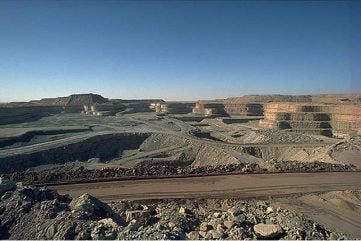
Despite recent decisions by Niger’s military leaders to revoke the uranium mining licences of France’s Orano for the Imouraren mine and Canada’s GoviEx for the Madaouela project, interest in Niger’s uranium resources has not abated.
Niger is the world’s seventh largest producer of uranium and has the highest-grade ores on the African continent. It accounts for 4.7% of the world’s natural uranium production. In 2022, Niger provided more than a quarter of the uranium used in the European Union, the second biggest supplier after Kazakhstan, according to Euratom. France has depended on Niger for up to 15% of its uranium needs.
Now the US-based African Discovery Group (AFDG) has signed a letter of intent to acquire the licence of Niger-based Central Global Access International Niger (CGAIN) for Ouricha-3. AFDG aims to establish a uranium exploration company, “with a focus on creating value around Africa’s under explored basins of uranium”.
As part of the transaction, AFDG is expected to issue shares to the permit holder and existing operating team. The transaction is expected to result in AFDG shareholders retaining the majority ownership of the company. The Niger government is expected to retain a working interest in the operations of the Niger licence after cost recovery. The transaction is expected to close in the foruth quarter of 2024, after which the company will change its name to African Uranium. “By working in concert with the government of Niger, African Uranium will create local skills to develop the highly promising nuclear industry on the continent.”
Ouricha-3 is located equidistant from mines in Arlit and Agadez (the commercial and air transport hub of the area”. Nearby power lines and a paved highway are key elements to new mine development. Ouricha-3 straddles the Arlit fault, a key structure for uranium mineralisation at Imouraren and the mines in Arlit. The permit lies 15km south of Imouraren, which contains one of the largest uranium reserves in the world at 200,000 tonnes.
Much of Ouricha-3 was explored at the reconnaissance level by Areva in 2006. Numerous surface anomalies have been identified but not fully investigated by past exploration programmes. The previous Orano (Areva) regional scale exploration programme included at least 161 boreholes, airborne and ground geophysics, geological mapping, and seismic surveys.
AFDG Chairman Alan Kessler said it was “a paradigm changing venture” for the company. “The confluence and timing of a number of factors – global energy transition, renewed global focus on uranium as a carbon free energy source, unrivalled African yields, the restart of Japan’s nuclear energy programme, as well as the World Climate Action Summit …in December of 2023…are all driving a supply-demand imbalance.” He added: “Uranium is projected to have a cumulative supply gap of around 1 billion pounds by 2040 according to the International Atomic Energy Agency. Africa is the key.”
Meanwhile, GoviEx Executive Chairman, Govind Friedland has sent a letter to stakeholders describing the withdrawal of its Madaouela Project licence as “perplexing” and “disappointing”. He said: “The decision to withdraw our mining rights did not follow the withdrawal procedure prescribed under the applicable mining code. We are fully prepared to pursue all necessary legal avenues to defend our rights and protect our investments and have formally written to the Ministry of Mines to contest the decision and to initially seek an amicable solution as per Niger’s Mining Convention. We are starting the process to secure independent assessments of damages related to the withdrawal of our mining rights.”
A report by Bloomberg that Turkish Foreign, Defence and Energy Ministers had visited Niger to ensure the supply of uranium for the Akkuyu NPP being built in Türkiye by Rosatom has been refuted by The Centre for Combating Disinformation under the Administration of the President of Türkiye. Bloomberg said Russia was planning to acquire Niger’s uranium assets. The Centre described the allegations as “untenable”.
The Centre said Turkey has not put forward any initiatives to Niger regarding the supply of uranium necessary for the Akkuyu NPP project noting that the visit of the Turkish delegation to Niger, was to discuss cooperation in the energy sector.
In May, Pan African News reported: “With the Nigerien military junta pivoting toward Russia and the dismissal of French troops at the end of 2023 and the pending withdrawal of US troops by mid-September, Paris and Washington have begun monitoring Niger’s uranium mines with satellites. As mentioned by Afrique Intelligence, the US National Reconnaissance Office has been observing the Arlit uranium mines from space for the past few weeks while Washington has enlisted the services of commercial satellite companies to surveil the mines as well.”
It continued: “With a similar token, French observation satellites and Airbus Pléiades Neo satellites are also monitoring the Arlit uranium mines for any visitors. Although the Arlit uranium mines have closed since the July 2023 coup, export-ready uranium remains at the site. The West no doubt is concerned Niger may sell it to one of its allies, Russia or Iran. Since Niger has invited the Chinese National Nuclear Corporation to reopen the Imouraren uranium mine – one of the largest uranium deposits in the world – located a few kilometres from Arlit, China is employing high-definition satellites of Changguang Satellite Technology to monitor the area as well.”






